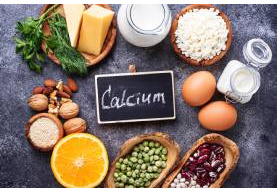CALCIUM DEFICIENCY: SYMPTOMS, CAUSES, AND NATURAL SUPPLEMENT REMEDIES

Calcium deficiency is a condition much more common than one might think and affects people of all ages.
But what is calcium? And why is it essential to have optimal levels?
Calcium is the most abundant mineral in the human body and is crucial not only for healthy bones and teeth but also for the proper functioning of muscles and the nervous system, as well as for blood clotting. When calcium levels in the blood fall below normal, the condition is called hypocalcemia.
Hypocalcemia: Incidence, Symptoms, and Consequences
Hypocalcemia is the condition in which low levels of calcium are detected in the blood. It can be either temporary or chronic, depending on its underlying cause. In many cases, it is completely asymptomatic in its early stages and, if left untreated, can lead to serious health issues.
As for symptoms, calcium deficiency can appear in varying degrees of severity and often develops gradually. Warning signs range from cramps and muscle spasms to irregular heartbeat and bone pain. Tingling sensations, dry skin, and brittle nails are also common symptoms of hypocalcemia.
There are various causes that can lead to calcium deficiency in the blood. One of the most common is poor dietary intake—following a diet lacking in calcium-rich foods leads to hypocalcemia and its related health problems. However, a low-calcium diet is not the only cause. The origins of hypocalcemia may also include hormonal imbalances, vitamin D deficiency, kidney or intestinal disorders, and the use of certain medications. Aging and menopause can also contribute to calcium deficiency.
Calcium Deficiency: Remedies and Treatment
While it’s true that hypocalcemia needs treatment, the type of treatment depends on the cause and the severity of the deficiency. Generally speaking, a helpful recommendation is to increase the intake of foods rich in calcium and vitamin D, get moderate sun exposure—with appropriate precautions—and engage in regular physical activity.
Specifically regarding diet, calcium-rich foods include dairy products, particularly aged cheeses, as well as fish. For those who are lactose-intolerant or who avoid animal products for personal reasons, such as people following a vegan diet, there are also plant-based foods high in calcium, such as tofu. Green leafy vegetables like kale, broccoli, spinach, cardoons, arugula, and turnip greens are excellent sources, as are legumes, nuts, and citrus fruits. For those who avoid cow’s milk, there are also fortified products—most plant-based beverages on the market clearly state calcium content on the packaging.
When diet alone isn’t enough, calcium supplements can be a valuable aid in restoring optimal calcium levels in the blood. Among the main natural sources of calcium often found in dietary supplements are marine algae, micronized eggshells, and plant-based calcium salts.
Supplements can also be used to address specific issues related to calcium deficiency, such as bone-related conditions. On this topic, Bottega di LungaVita offers a dedicated line of supplements for bone and cartilage health. One of these is Cartilagen Collagen, a dietary supplement specially formulated for the health of joints, bones, and cartilage, containing marine collagen, glucosamine, acerola, vitamins C, D, and E, and minerals such as copper and zinc. Free from gluten and lactose and with a pleasant fruity taste, it is an ideal product for maintaining normal function of bones, connective tissues, and cartilage.
Read also: Collagen – what it is, what it does, how to choose a product, and how to use it
Disclaimer: The information in this article is for informational purposes only and is not intended to replace medical advice. Before taking any dietary supplements, it is always advisable to consult your doctor.

















